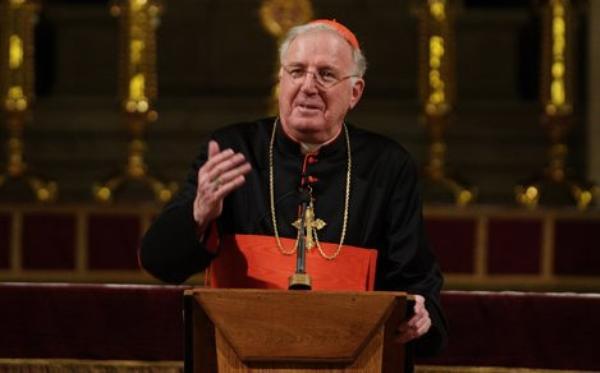In the second and final part of his recent lecture, Cardinal Murphy-O’Connor highlights three aspects of the life of the Church in England and Wales that are crucial to the Church’s understanding of its own identity and mission: formation, parish renewal and prayer.
Towards the Future: The Life of the Church Ad intra
So now let us turn to the life of the Church, with the gifts that it has to face the future with confidence and with hope. I am, like Pope John XXIII, not a prophet of gloom. As one writer has put it, “We should remember that there are rhythms of faith and history. The life of the Spirit grows often in hidden ways when all the signs are contrary. In these times we are not dying or declining, we are being made ready and learning anew who we are and what we are called to do. The world may try to describe us, but it cannot judge the life of the Spirit or the work that God is doing in his people.”
I say this because I think the greatest danger for us at the moment is to let ourselves believe what secular culture wants us to believe about ourselves, namely, that we are becoming less and less influential and are in decline. There are certainly challenges and there is much work for us to do. But on the contrary I believe that the Church has a vigorous life, and a crucial role to play in our society - more important than at any other time in our recent history.
There are many different voices within the Church at the moment seeking to explain our problems and what we need to do to put them right. We must be attentive and discriminating but we must not allow our energies to get drawn into a Corinthian brawl, “I belong to Paul - I belong to Apollos” (1 Cor. 1.12). We belong to Christ and we are bound in unity by the ministry of Peter and the Apostolic College.
Every Bishop and every Bishops’ Conference has the responsibility of discerning what is the best way for the local Church to live in and respond to the situation in which it finds itself. They have a duty to be faithful to the truth of faith and the Magisterium of the Church and this is not a burden but a source of life. Even so, each local church will bring its experience and needs to that task. It will also judge the best way of accomplishing its mission to make the life of the Gospel real in its own culture. That means there will be legitimate differences of style, of emphasis and approach. This is not a problem or a threat or a sign of disintegration or assimilation, rather it is a sign of vitality. Unity is not uniformity. It is also a sign of confidence and above all it is a sign that the Church is not afraid to go out and meet the culture and to order its life to the service of the Gospel. If, like me, you have had the experience of visiting the Church in many different parts of the world, you cannot help but see this and rejoice in the life of the Spirit it manifests. But by the same token you will also know you are in the Catholic Church. The genius of Catholicism is that it is genuinely universal and responds to every culture without ceasing to be itself.
So this, it seems to me, is a time of preparation rather than diminishment. I have spoken of the creativeness of the Christian difference. The Spirit is preparing us to bring something ‘other’, something ‘different’ to our culture, something which our culture cannot bring for itself. This ‘other’ is nothing else but the truth and life-giving presence of God.
At the beginning of this lecture I summarised the way in which the Catholic community has thought of its mission since the restoration of the Hierarchy as ‘keep the faith and the conversion of England’. Has it really changed that much? The work since Vatican II has been deepening our faith and coming to appreciate its dynamism, especially in the renewed theology of the laity and the universal call to holiness. Perhaps now more than ever we can see that what “the conversion of England” means is reaching out to a culture which is deeply secularised and yet longs to hear a voice of meaning and hope.
So where to be begin? I want to single out three aspects of the life of the Church today that seem to me to be crucial: formation, parish renewal, and prayer.
Formation
In the 19th century the Church in England and Wales made a courageous decision. It would devote its energies and resources to educating its people. It well understood that an education was critical, not only to the life of the Church itself, but also to the capacity of the Catholic community to play a significant and productive part in the life of the nation. We have seen the wisdom of that policy and the benefits that it has brought to many generations of Catholics and their families. We now have a vibrant, professional and committed educational system throughout England and Wales. I think our schools have publicly demonstrated their value. They have shown that so called ‘faith schools’ do not breed prejudice or division; indeed they are often the most creative and innovative in dealing with such problems. But we now need to give special attention and care in all our programmes to formation in the life of faith. The Church badly needs confident, theologically and spiritually well-formed lay as well as clerical members if it is to respond to the challenges of a secular world. Our people need to know the tradition in which they stand; they have a baptismal right to be nourished by its wisdom and its beauty. Above all, as the recent Synod on The Word of God brought out, we need to nourish ourselves and our faith with the Gospels. It is there that we come to know Christ, to hear his word, and enter into the gift and mystery of the kingdom.
It is now 40 years since the end of Vatican II and we are still in the process of appropriating its profound insights. We need to return to the Council, reading it in the light of our experiences as Church and the new situation of our world. We should try to attend especially to the social teaching of the Church because it has a richness, wisdom and humanity.
Renewal of the Parish Community
But for most Catholics their life, both social and spiritual, happens in their parishes. Again and again, one must strive to create from our parishes, not a geographical area or a canonical entity, but a living community. The parish is the first point of contact when people move in to a new area of life. Not only is it a place where people gather on a Sunday, it is the space in which lives and histories are held.
In the rhythms of the liturgical year our stories are told, our weariness held and carried, our pain touched and our brokenness mended. In that meeting with others of faith are the familiar word of the Mass, the candles, the prayers, the hymns, the familiar personalities of the saints and martyrs, our worries and concerns, our failures and successes; all brought into the movement of God’s triune life. Almost imperceptibly we are touched by the grace of a timeless love that meets us in our time. Hear, too, mingling with our lives are the lives of all who have come here and all who will come here. We know we are not perfect and we know that our parishes are not perfect, but sometimes we catch a sense of all those generations of faith who have lived lives like our own and so we settle into a faith well lived. Our lives are touched with a presence that waits on us.
So, I do not believe our parishes are dead or dying. Even though we may have to reduce their number we must give priority to rediscovering how vital the parish is to nourish our faith in so many different ways. The Eucharist is, of course, ‘the source and summit’ of the Church’s life. As well as being reverently and prayerfully celebrated it needs to be informed by the celebration the Word. Scripture must be opened up to people, so that they in their turn can read it and meditate upon it, letting it feed and shape lives. The homily is a privileged moment of spiritual leadership which needs prayer and reflection as well as study. But above all, people need to see how their priest lives the gospel which he is charged with preaching and how it illuminates and guides his life. If the Word is not alive in us, how can we give life to others?
If our parishes are places where we are known and welcomed, especially if we are new or visiting, then I think everyone benefits. It is a way of building up the body of Christ and demonstrating that our believing means belonging.
Prayer
At the heart of all our words and actions is the gift of prayer. I have been speaking about the secular challenges of this world, but everywhere I see a hunger for spirituality, a desire for something that can give meaning, hope and peace. And if anything is our strength it is our prayer. It is out of this that we live; without it our words would be empty and our actions powerless.
Prayer is not complicated, it does not need books or courses or professors. All we need is our faith, our desire and our need. With these we are drawn each day to the One who is our life, our joy and our hope. Our need, our desire to pray may take us to church, a holy place or a shrine, but the fact is that we can pray wherever we find ourselves, whatever our state. The secret of prayer is that it takes two – myself and God. Once we realise this, prayer becomes simple and straightforward because we know that God has given Himself so completely and totally to us, we know that he is always there for us. God does not need to find us, he has never left us. But sometimes we can leave Him. Yet no matter how long we have been away or how deep our silence has been, he has never left us. On every road, down every path, in every situation he has been there waiting for us to speak, to call out His name, to come home.
Often God has to purify our faith and our trust. At times we reach out to Him and we can feel only an absence; the silence can be frightening and we can feel abandoned. These moments are not easy. But God does not play games with us. Even in these dry and painful moments, like the Israelites in the desert or Christ in his temptations, we are being prepared to enter more deeply into the mystery of Christ and share in his mission. Often in these times, too, we discover the beauty of the Church and our need of it. In the daily round of its prayer and sacrament, in the unseen lives of its faithful, we are carried and our faith, no matter how weak or weary, bruised or strained, is taken up and made complete. In the simple but profound words of the Mass, ‘look not upon our sins but upon the faith of your Church.’
When a person prays, even a little, two things begin to happen. First, we begin to know our poverty. As St Augustine says, “When we pray we are all God’s beggars.” Second, we begin to love, maybe for the first time, in a different way. If God invites us into His life, how can we not know how poor we are? But this poverty is not a lack rather it is a sense of how much we have received. From it grows a new way of loving. This love fills our hearts; it is a gift from the Spirit who teaches us and opens our eyes and our hearts to the way God loves. One of the gifts that I have been given in my comparatively long life is to meet and experience the lives of so many saintly and holy people filled with the love of God and giving their lives to others in a way that manifests that goodness of God in a way that is also quite extraordinary. This is the key to evangelisation – to live our lives so that we may elicit faith in others.
All our prayer flows from and returns to the great prayer of the Holy Eucharist in which Christ shows us that the heart of prayer is His action. And so our hearts are lifted up, not by our own effort, but by Him, and we discover that even in sacrifice there is glory and joy. If each day our lives are renewed in this prayer, we need not worry about the future and what it may bring. This is why I think Wiseman’s letter from the Flaminian Gate, and Newman’s sermon on the Second Spring should not be read as exercises in restorationist triumphalism. Each in its own way is effectively framing the community’s ‘Magnificat’.
Conclusion
In this lecture I have looked back at the past 160 years and seen the challenges that the Church faced in the Episcopal light of my predecessors as Archbishop of Westminster. We have seen how the Catholic Church in these times has grown and developed, but also changed in its attitude and approach because the culture of our country has changed and the Catholic community itself has changed. We are beginning to understand our identity and vision in a new way in this, our secular, multi-cultured society. It is a vision that doesn’t take us out of this world, but prompts us to be ourselves in it, finding new ways to seek a place in the Areopagus of our nation and to find, in collaboration with others, the right not just to exist, but to express what we deeply believe is important for the common good. At the heart of this is the search for God which is at the heart of every human person. We do not seek to impose our views on others but to offer them as a way – that we believe is the way – for life to flourish.
In a sense I have been speaking about the three great theological virtues of Faith, Hope and Love that mark our Christian life. But there are also the ‘Cardinal’ virtues – if you see what I mean. They are the virtues which have indeed marked my predecessors and the community of faith which they led. Of those virtues of Prudence, Justice, Fortitude and Temperance, I think it is the gift of Fortitude that has been most immediately evident of the Catholic Church in England & Wales over the past 150 years. I pray that it is also the virtue that distinguishes us most too in this time. Fortitude it is not a grim or sullen virtue. It has an understated but joyful strength; there’s a serenity in it, for the faithful and enduring strength that it brings rests on the knowledge that Christ is Lord of every age and all time. It is Fortitude that makes us trustworthy witnesses, faithful to the precious gift of salvation that we have received for all humanity. In the words of 1 Peter it is a readiness, whatever the season, ‘to give an answer to everyone who asks the reason for the hope that we have.’ (1 Peter. 3.15)
The time of Lent is a time when we can reflect on these things, with renewed hope and life. In the Preface we say today, “Each year you give us this joyful season when we prepare to celebrate the Paschal mystery with mind and heart renewed. You give us a spirit of loving reverence for you our Father and of willing service to our neighbour. As we recall the great events that gave us new life in Christ, you bring the image of your Son to perfection in us.’ The prayer today also expresses it all: “Lord, may everything we do begin with Your inspiration, continue with Your help and reach perfection under Your guidance. Amen.”
Cardinal Cormac Murphy-O’Connor is Archbishop of Westminster and President of the Catholic Bishops’ Conference of England and Wales.
The Cardinal’s lecture was delivered in Westminster Cathedral on 26th February 2009.
![]() Read part one of the Cardinal's lecture
Read part one of the Cardinal's lecture![]() Diocese of Westminster
Diocese of Westminster






